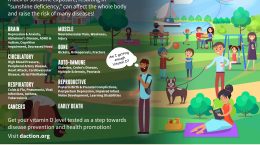Published on July 24, 2024
Learn more about our GrassrootsHealth Scientist Panel Members, their contributions to vitamin D research, and what inspires them to keep moving the research forward
Key Points
- To highlight the credibility and add depth to our Scientists’ Call to Vitamin D*action, we will be interviewing several of the scientists responsible for the research supporting it. Today, we are honored to interview Dr. Leigh A. Frame.
- Dr. Frame’s research is dedicated to understanding and addressing the complexities and confounding factors in vitamin D status and in the design of studies to test this; she also focuses on specific populations at risk of deficiency and advocates for methodological rigor and ethical practices in vitamin D research.
- One of Dr. Frame’s key messages, based on her research, is for individuals to engage in regular outdoor physical activity, which can significantly improve vitamin D status through increased sun exposure. This is crucial for maintaining overall health, including bone health and immune function, and supports fitness and longevity.

GrassrootsHealth is honored to have a panel of senior vitamin D scientists and researchers who have contributed to and endorsed our Call to Vitamin D*action. The purpose of this Call to Action serves as a consensus among top vitamin D researchers that the key to vitamin D for health is not measured by intake but by achieved serum level – specifically – achieving and maintaining a 25(OH)D level between 40-60 ng/ml (100-150 nmol/L).
There are many messages about how vitamin D is essential for our health that fail to properly address how the individual should approach vitamin D dosing for themselves, especially since research shows that one dose does not fit all individuals. There is also confusion about what target vitamin D level is optimal. Our Call to D*action is a clear and concise message, from the vitamin D experts themselves, to share with those who hear about the benefits of vitamin D but who are often confused or not informed about what to do with that information for their own health.
To add further credibility to our Scientists’ Call to Vitamin D*action and to help deepen your understanding of the research that supports it, we will be interviewing several of the scientists responsible for that research. Today, we welcome Dr. Leigh A. Frame to our panel of vitamin D scientists and are excited to share her interview with you!
Interviews with the Scientists: Dr. Leigh A. Frame
 Introduce yourself (name, degrees, current position, affiliations, etc.)
Introduce yourself (name, degrees, current position, affiliations, etc.)
Leigh A. Frame, PhD, MHS
Associate Director, Research Director, Resiliency & Well-being Center
Program Director, Integrative Medicine
Executive Director, Office of Integrative Medicine and Health
Associate Professor, Clinical Research and Leadership / Physician Assistant Studies
George Washington University School of Medicine and Health Sciences
Washington, DC
https://framecorrlab.smhs.gwu.edu/
To the right is a picture of me with the portrait of EV McCollum, discoverer of vitamin D, shortly after my graduation from the Johns Hopkins Bloomberg School of Public Health (in the lobby of JHBSPH).
If you have social media accounts that you would like for us to connect with and share, please list them here:
Instagram: https://www.instagram.com/phd_leigh/
X (Twitter): https://x.com/phd_leigh
Facebook: https://www.facebook.com/PhDLeigh/
LinkedIn: https://www.linkedin.com/in/leighframephd/
Research Gate: https://www.researchgate.net/profile/Leigh-Frame
ORCID: https://orcid.org/0000-0002-1475-2778
How much vitamin D do you take, and how long have you been taking that amount of vitamin D?
I titrate my supplementation dose to my serum 25(OH)D, targeting 40-60 ng/mL, which is indicated by the immunomodulatory effects of vitamin D. This means I take 4,000 IU/day in winter and 1,000 IU/day at other times of the year (I spend too much time inside!). I have maintained a similar regimen for about 15 years.
ABOUT YOUR RESEARCH
How long have you been involved in vitamin D research?
Since I started my master’s dissertation, “Vitamin D and Dermal Immunity: the Sunshine Paradox,” in 2009.
Do you have a specific focus with your vitamin D research?
My research is dedicated to understanding and addressing the complexities and confounding factors in vitamin D status and in the design of studies to test this. I also focus on specific populations at risk of deficiency and advocate for methodological rigor and ethical practices in vitamin D research.
How did you get into vitamin D research/What motivated you to start researching vitamin D?
During my master’s program in Immunology, I attended a lecture on the armadillo model of tuberculosis (TB). The speaker emphasized the crucial role of vitamin D as an immune-modulatory hormone and explained how taking TB patients outside for ‘fresh air’ helped them produce vitamin D, which was beneficial for their immune response.
This lecture made me realize that my hobby of nutrition could be scientifically integrated with my passion for the immune system. It inspired me to pursue this combined interest in my career.
I started by working on my Master’s dissertation titled “Vitamin D and Dermal Immunity: the Sunshine Paradox.” This led me to apply for a PhD in Human Nutrition, where I completed my dissertation on “Alteration of the vitamin D endocrine system in obesity: the role in patients undergoing bariatric surgery.”
What areas of research were you involved in before you started with vitamin D/what was your professional focus before vitamin D research?
I started my career studying the effects of bariatric surgery on upper airway patency and the resolution of sleep apnea and inflammation following the procedures.
What keeps you involved in the field?
My passion is fueled by the zeal I see ignited in each one of my students when they learn about vitamin D. The students who are healthcare professionals in my Nutritional Immunology course universally love the topic and catch the vitamin D bug, as it is so fruitful with minimal work and very low risk for their patients.
What are you planning on researching next in relation to vitamin D?
We plan to conduct a study investigating fitness versus vitamin D status and how this may confound the effects of vitamin D in certain health outcomes. Better understanding why some observational studies do not pan out in clinical trials will allow us to better design studies. This will then allow us to key in on the best ways to use vitamin D as a tool to improve well-being.
YOUR MESSAGE TO THE PUBLIC ABOUT VITAMIN D
What is the key message you want to get out about vitamin D 1) to individuals, 2) to practitioners, and 3) to public health authorities?
To Individuals:
Be aware of your vitamin D status, especially if you lead a predominantly indoor lifestyle, live in regions with limited sunlight, or have limited sun exposure for any reason. Consider vitamin D supplementation if necessary and aim to get some sensible sun exposure when possible.
Engaging in regular outdoor physical activity can significantly improve your vitamin D status through increased sun exposure. This is crucial for maintaining overall health, including bone health and immune function, and supports fitness and longevity.
To Practitioners:
Recognize the variability in individual responses to vitamin D supplementation. Tailor vitamin D recommendations based on baseline status, lifestyle and cultural factors, and specific health conditions, particularly for those undergoing or recovering from bariatric surgery (chief concerns: obesity, wound healing, malabsorption).
Encourage patients to engage in outdoor physical activity for vitamin D synthesis and overall healthspan benefits. Counsel them on sensible sun exposure and precautions.
To Public Health Authorities:
Advocate for standardized:
1) Study designs that include titrating vitamin D status instead of applying a blanket dose that may be insufficient for some and too much for others.
2) Reporting guidelines in vitamin D research to better understand the relationship between outdoor physical activity, sun exposure, baseline vitamin D status, and risk factors. This will improve the quality of evidence and inform more effective public health interventions.
Focus on addressing widespread micronutrient deficiencies, including vitamin D, especially in vulnerable populations such as those preparing for bariatric surgery. Ensure policies support adequate screening and supplementation where necessary.
Develop public health campaigns that encourage outdoor physical activity as a natural and effective way to improve vitamin D status and overall health. Highlight the dual benefits of physical activity and vitamin D synthesis from sensible sun exposure as well as the necessary precautions.
GENERAL THOUGHTS ON VITAMIN D RESEARCH
What are some hurdles that you that you have encountered when researching vitamin D or that you see are in the way of moving vitamin D research into practice?
I am honestly very concerned about the state of vitamin D research, as many of the studies have been designed on a shoestring, meaning they are not ideal, or have been designed with a pharmaceutical model using a one-size-fits-all dose, when we know that is not appropriate for nutrition generally and vitamin D in particular. Yet, this was historically considered good design and now is a holdover from a time when we thought there was no such thing as a food matrix or the need to study dietary patterns since we could just look at intake of a single nutrient. This flawed evidence-base is what decisions are made from, especially the largest randomized controlled trials, which are the least likely to titrate their doses to a specific vitamin D status. The current state of vitamin D research requires a paradigm shift towards personalized nutrition and collaborative efforts to enhance study designs and reporting standards.
What questions do you have for other vitamin D researchers and scientists?
How can we come together and improve the quality of the research in our field moving forward?
MORE ABOUT YOU
 What do you enjoy doing when you are not researching vitamin D?
What do you enjoy doing when you are not researching vitamin D?
I am a yogini of 25 years. I love food and cooking. I make jewelry and am also learning Italian.
What are some of the ways you engage in work/life balance?
I put appointments on my calendar for what I want to prioritize. This included yoga, meditation, eating healthy, etc. I treat them like I would any other appointment—only cancelling them if it is an emergency.
I am also sure to take truly disconnected time away. That means not checking email on vacation. My husband and I also take digital detoxes, preferably in nature, and we make it clear to everyone that we will be unreachable (phones off!).
MORE ABOUT YOUR RESEARCH
What are some of the key findings from your research involving vitamin D?
Corr P, Badawi A, Vu S, Frame LA. Outdoor Physical Activity as a Confounder for Vitamin D Status: Findings from a Scoping Review. Nutr Rev. In Revision.
The review found conflicting evidence regarding the relationship between vitamin D status, sun exposure, and physical activity. It highlighted the potential confounding effect of outdoor physical activity on vitamin D-related health outcomes, particularly those related to cardiorespiratory fitness. The study emphasized the need for standardized reporting in research to better understand and quantify these relationships.
Corr P, Badawi A, Vu S, Frame LA. Outdoor Physical Activity as a Confounder for Vitamin D Status: A Scoping Review Protocol. medRxiv. January 2023.
The review protocol highlighted the complexity of assessing vitamin D status due to outdoor physical activity, which increases sunlight exposure and consequently vitamin D synthesis. This confounding factor complicates the interpretation of vitamin D levels in studies and emphasizes the need for careful consideration of outdoor activity when evaluating vitamin D status.
Hands JM, Corr PG, Frame LA. Clarifying the heterogeneity in response to vitamin D in the development, prevention, and treatment of type 2 diabetes mellitus: A narrative review. Int J Environ Res Public Health. 2023.
This review identified variability in individual responses to vitamin D supplementation in the context of type 2 diabetes mellitus (T2DM). Factors such as genetic differences, baseline vitamin D status, and varying doses of supplementation contribute to this heterogeneity. This suggests a need for personalized approaches to vitamin D supplementation in T2DM management.
Hands JM, Patrick R, Frame LA. Comment on Vitamin D and Risk for Type 2 Diabetes in People With Prediabetes: Vitamin D supplementation, prediabetes, and T2DM – Is there a role for Immunologic Dysregulation?. Ann Intern Med. 2023.
This correspondence discussed the potential role of immunologic dysregulation in the progression from prediabetes to T2DM and how vitamin D supplementation might influence this process. It emphasized the need for further research to understand the immunomodulatory effects of vitamin D in prediabetic individuals.
Frame LA, Fischer JP, Geller G, Cheskin LJ. Use of Placebo in Supplementation Studies—Vitamin D Research Illustrates an Ethical Quandary. Nutrients. 2018.
This paper explored the ethical dilemmas associated with using placebos in vitamin D supplementation studies, particularly when vitamin D deficiency is prevalent and supplementation is known to have health benefits. In contrast, not using a placebo can reduce the effect size and lead to false negative results.
Peterson LA, Zeng X, Caulfield-Noll CP, Schweitzer MA, Magnuson TH, Steele KE. Vitamin D status and supplementation before and after bariatric surgery: a comprehensive literature review. SOARD. 2016.
This review found that bariatric surgery patients often have low vitamin D levels pre-surgery and that supplementation is crucial both before and after surgery to prevent deficiencies and associated complications. It highlighted the importance of monitoring and personalized supplementation strategies for these patients.
Peterson LA, Cheskin LJ, Schweitzer MA, Magnuson TH, Steele KS. Treatment for vitamin D deficiency prior to bariatric surgery: a prospective cohort study. Obesity Surgery. 2015.
This study demonstrated the efficacy of pre-operative vitamin D supplementation in improving vitamin D status and reducing deficiency-related complications post-surgery. The findings support routine screening and supplementation for bariatric surgery candidates.
Peterson LA, Canner JK, Cheskin LJ, Prokopowicz GP, Schweitzer MA, Magnuson TH, Steele KS. Proxy measures of vitamin D status — season and latitude — correlate with wound complications and length of stay after bariatric surgery in the Nationwide Inpatient Sample, 2001-2010: a retrospective cohort study. Obesity Science & Practice. 2015.
This study found that proxy measures such as season and latitude, which influence vitamin D synthesis, were correlated with surgical outcomes like wound complications and length of hospital stay. This suggests that geographic and seasonal factors should be considered in perioperative care and that more research and screening is needed for vitamin D in this patient population.
Peterson LA, Cheskin LJ, Furtado M, Papas K, Schweitzer MA, Magnuson TH, Steele KS. Malnutrition in bariatric surgery candidates: Multiple micronutrient deficiencies prior to surgery. Obesity Surgery. 2015.
This research identified widespread micronutrient deficiencies, including vitamin D, among bariatric surgery candidates. It underscored the need for comprehensive nutritional assessment and supplementation before surgery to address these deficiencies.
Peterson LA. Bariatric surgery and vitamin D: key messages for surgeons and clinicians before and after bariatric surgery. Minerva Chirurgica. 2016.
This review provided practical guidelines for surgeons and clinicians on the management of vitamin D status in bariatric surgery patients, emphasizing the importance of pre-operative and post-operative supplementation to prevent deficiency and associated complications.
Peterson LA. Early, Personalized Vit D Needed After Bariatric Surgery: Most patients go into surgery malnourished. MedPage Today. 2016.
This article stressed the necessity of early and personalized vitamin D supplementation post-surgery due to the high prevalence of pre-operative malnutrition. It advocated for tailored supplementation plans to ensure adequate vitamin D status and improve patient outcomes.
Thank you, Dr. Frame, for sharing more about yourself and your research! We appreciate your contributions to our current knowledge of vitamin D.
View Dr. Frame’s Scientist Page here
Vitamin D is an Easily Modifiable Factor to Help Improve Disease Outcomes – Are You Getting Enough?
 Having and maintaining healthy vitamin D levels and other nutrient levels can help improve your health now and for your future. Choose which additional nutrients to measure, such as your omega-3s and essential minerals including magnesium and zinc, by creating your custom home test kit today. Take steps to improve the status of each of these measurements to benefit your overall health. You can also track your own intakes, symptoms and results to see what works best for YOU.
Having and maintaining healthy vitamin D levels and other nutrient levels can help improve your health now and for your future. Choose which additional nutrients to measure, such as your omega-3s and essential minerals including magnesium and zinc, by creating your custom home test kit today. Take steps to improve the status of each of these measurements to benefit your overall health. You can also track your own intakes, symptoms and results to see what works best for YOU.
Enroll and test your levels today, learn what steps to take to improve your status of vitamin D (see below) and other nutrients and blood markers, and take action! By enrolling in the GrassrootsHealth projects, you are not only contributing valuable information to everyone, you are also gaining knowledge about how you could improve your own health through measuring and tracking your nutrient status, and educating yourself on how to improve it.





